FirstLanguageEnglish.com
Your key to IGCSE First Language English!
- Your Profile
- Membership Signup
- Publications
- Descriptive and Narrative Essay Bank
- Directed Writing Sample Responses – EnglishFirstLanguage.net
- Writer’s Effect – Sample Answers
- Summary – Sample Responses for Question 1(f)
- Mission and Motivation
- Live Tuition Class Interest Form

Search Here ….
Paper 2: directed writing (question 1) – how to excel.
Hello there! Today, we’re going to introduce you to the wonderful practice of *drumroll* directed writing!
Here’s what that’s all about!
In directed writing…
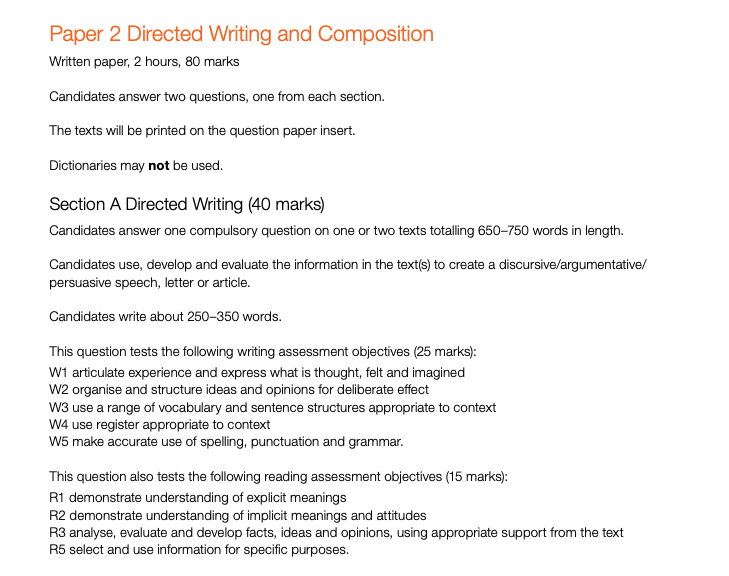
So why is this directed writing? It’s directed writing because it’s specifically directing you to create a particular type of text – either a discursive/argumentative/persuasive speech, letter, or article.
By the fundamental counting principle, there are a grand total of 9 types of things that you can be asked to do, then.
i) Discursive speech ii) Discursive letter iii) Discursive article iv) Argumentative speech v) Argumentative letter vi) Argumentative article vii) Persuasive speech viii) Persuasive letter ix) Persuasive article
But you’re not just going to write these essays offhand!
Have a look at a sample question below, from Summer 2021, Paper 2, Variant 3.
Question 1 Write a speech to give to an audience of young people suggesting how they can make changes effectively in their lives. In your speech you should: • evaluate the views given in both texts about making resolutions • give advice, based on what you have read, about how young people might manage the changes they want to make in their lives. Base your speech on what you have read in both texts, but be careful to use your own words. Address both of the bullet points. Write about 250 to 350 words. Up to 15 marks are available for the content of your answer, and up to 25 marks for the quality of your writing.
As you can see, the question is asking you to write a speech. Moreover, it is asking you to make a speech to young people – how incredible! What a privilege you have in front of you to influence the next generation!
…Does this mean that you can go ahead and tell people that they should all go on TikTok and achieve their dreams by doing the magic bomb dance?
…Unfortunately no, because the text is also asking you to evaluate the views in both texts about making resolutions, and it is asking you to give advice, based on what you have read, about how young people might manage the changes they want to make in their lives.
That is very specific, and you can’t go against that, but there is plenty of excellence that you can achieve!
Well, how do we do that? We have to read the text! Have a look here:
Text A: Anyone up for a New Year challenge? The article below discusses some strategies for keeping resolutions. No one seems sure when the idea of making resolutions at the turn of a new year began. The ancient Babylonians are believed to have celebrated the beginning of a new planting season by resolving to make changes for the better. The Roman god Janus – the one that looks both backwards to the past and forwards to the future – inspired citizens to promise improvements in the coming year. In the modern world, many countries and cultures celebrate their new year with ‘wishes’ rather than resolutions, but social media, perhaps inevitably, has ensured that personal struggles to exercise more / study harder / eat more healthily / be kinder have become collective experiences. Most people will not succeed with challenges for more than a few weeks: willpower is not a talent that a lucky few are born with, according to some research. Willpower is a skill to be practised. Frank Ryan, author of ‘Willpower for Dummies’, explains: ‘Our level of willpower fluctuates according to our motivation in any given situation. Everybody can learn to use their willpower more effectively.’ To maximise our chances of sticking to resolutions, Ryan says, we should identify our ‘willpower profile’. ‘Some people are more impulsive than others. That comes down to personality. For some, scheduling time to reflect on your progress by keeping a diary can be helpful. For others, signing up for a group where everyone has a common goal can help to strengthen your resolve, as can sharing even small progress with others.’ Magdalena Bak-Maier, a neuro-scientist and coach, encourages people to make a written plan which sets specific goals. ‘You might have announced: this year I’m going to write a novel or I’m going to run a half-marathon, but those are just ideas, not plans. A plan is: I’m going to get up at 6:30 Monday to Friday and write 500 words of my screenplay before I leave for work. Or I’m going to sign up for 10 water-colour classes and go every Monday at 18:00.’ Finally, be kind to yourself. ‘Anticipate lapses and plan for them,’ says Ryan. ‘Changing habits, or establishing new ones, is a motivational marathon, with inevitable trips along the way.’ It’s important to stay optimistic. ‘Feeling negative and self-critical actually reduces your willpower,’ says Ryan. ‘Negative moods are the enemy of willpower and self-blame is the main culprit.’ Text B The article below is about some of the benefits of making resolutions. I like a challenge, and what better way to push myself than at the start of the New Year with wholly ridiculous resolutions? One year, I randomly decided I’d practise yoga every day for the following 12 months without ever having tried yoga before – very ambitious. Last year I promised myself I’d go bouldering every single Thursday … indefinitely. And of course, for the past two years, I’ve attempted to have a plant-based diet for the first month of the year knowing I love cheese more than most things in this life. Needless to say, all my grandiose New Year’s resolutions have been a tremendous flop. Essentially every year I set myself up for failure. Normally I feel exceptionally guilty about how much of a slob I’ve become by the end of the year and try to rectify it by attempting resolutions that are ambitious at best and delusional at worst. Luckily, I’m not alone with my futile declarations as 80 per cent of New Year’s resolutions fail within weeks. I lasted 27 days the first time I attempted a plant-based diet – all it took was one encounter with a margherita pizza and all my hard work was undone 4 short days before the end of the challenge. And when it came to bouldering, I got a (not so cheap) 10-day pass to a climbing centre, and let’s just say a year later there’s still about four visiting passes left to use. Yes, my resolutions never go to plan, but they have taught me a wealth of new, sometimes pointless, skills. I’m often too hard on myself and forget all the days I did actually stick to my challenges and what I’d gained from them. I lasted 27 whole days as a vegan yet I was more upset about the four days that I didn’t manage. I stuck at it the next time though, learning from my mistakes. The fully vegan diet didn’t stick but I now know how to realistically work more plant-based meals into my diet rather than going cold turkey (excuse the pun) and spending a whole month in near starvation. And I didn’t do yoga every day, because that’s ridiculous, but I did practise it daily for the first few months and continued on and off long after that – it truly made me feel stronger and happier in myself. I definitely don’t go climbing as often as I’d like to but the point is I still go when I can. Being realistic in my expectations is where I really fail every year. Daily challenges, massive changes to my diet and physical activity can’t just happen overnight.
Okay, so here’s how you do well on this.
Let’s start.
- Understand the question: Before you start writing, read the question carefully and understand what you are being asked to do. Look for specific details, such as the audience, purpose, and format of the writing. Keep these in mind throughout your writing process and make sure to refer back to the question time and time again as you write. The reality is that many students actually lose track of the writing prompt as time goes by, and thereby become unable to write coherent or correct responses – not just because they don’t understand what the prompt was in the first place, but often because they just lost track after a while!
- Plan your response: To ensure that your writing is well-organized and coherent, create a brief outline or plan before you begin. This can include jotting down the main points you want to cover and the order in which you want to present them. Planning will help you maintain a clear focus and avoid straying off-topic.
- Use the appropriate format and register: IGCSE directed writing tasks may come in various formats, such as letters, articles, reports, or speeches. Be familiar with the conventions of each format and adhere to them in your writing. Moreover, consider the register (formal or informal) required by the task and ensure your language, tone, and style match the intended audience and purpose.
- Develop strong arguments: Make sure to develop strong and relevant arguments to support your ideas. Use a combination of facts, examples, and personal experiences to make your arguments persuasive and engaging.
- Use varied sentence structures and vocabulary: To achieve a high mark, demonstrate a wide range of vocabulary and sentence structures. This will not only make your writing more engaging but also showcase your linguistic abilities. Avoid using clichés, jargon, or overly complex language that may confuse your reader.
- Maintain coherence and cohesion: Ensure that your writing flows smoothly from one point to another by using appropriate linking words and phrases, such as ‘however,’ ‘in addition,’ ‘on the other hand,’ etc. This will help create a coherent and cohesive piece of writing that is easy to follow and understand.
- Proofread and edit: Once you have finished writing, take the time to proofread and edit your work. Check for spelling, grammar, and punctuation errors, and make sure your writing is clear and concise. Don’t be afraid to make changes if necessary.
- Practice and seek feedback: The more you practice, the better you will become at directed writing. Try completing past IGCSE directed writing tasks and ask your teachers, peers, or tutors for feedback. This will help you identify areas for improvement and gain valuable insights on how to enhance your writing.
We will update this post a little later with an example directed writing sample, written to the prompt but we hope that you’ve enjoyed this piece so far!
Look forward to it!
victortanws
Leave a comment cancel reply.
You must be logged in to post a comment.
Recommended Posts

Welcome to FirstLanguageEnglish.com!
Welcome to the ultimate guide to conquering the 0500 First Language English exam! Whether you’re a student or a teacher, we are confident that you’ll find some value here. The materials on this site will break down the IGCSE First Language English curriculum for you, offer you some helpful tips, […]
Genre Primer: Non-Fiction
Hey guys, V back with you with yet another primer on literary genres – and today we’re talking about nonfiction! Now, before you click away thinking nonfiction is just dusty textbooks and dry how-to guides, let me stop you right there. Nonfiction is so much more than that. It’s the […]
Descriptive/Narrative Composition Banks Updated (November 21st)
Dear all, It’s been a minute, but back to updating the Descriptive/Narrative composition banks! This update includes essays from May 2024. Want to gain the exact examples you need for that A*? Sign up for a Premium membership so that you don’t miss out, today! V. You’ll find the new […]
Your Guru is Not Enough: Our Extrinsic and Intrinsic Motivations
The entire premise of this site is that it offers you a set of solutions, strategies, and suggestions on how you should excel in the art of rhetoric, the English language, and across both reading and writing. Here, we’ve talked a lot about language analysis (and we may talk more), […]
12 Must-Read Books to Transform Your Writing: From Grammar to Storytelling Mastery
One of the coolest things that we can do as a species is write, and write you definitely have to on every aspect of life and also the IGCSE First Language English exams. Almost every good writer is also a good reader, and how appropriate that is given that language […]

The Reading We Do
As a teacher of English, it’s natural that I want my students to have both a good understanding of language and also a strong ability to produce language. Luckily for all of you, I have a (no-brainer?) recommendation for all of you – both of these are improved by reading […]
A Public Library Memory
In this blog, I often talk about how to get better at the English language. Today, I thought I would do something a little different: I’d like to share a story with you – the story of what I genuinely believe made me good at using English. I was born […]
Insert/edit link
Enter the destination URL
Or link to existing content
English For All
A blog in sharing knowledge about English. SHARING IS CARING :)
- SPM SAMPLE OF ESSAYS - CONTINUOUS WRITING
SPM SAMPLE OF ESSAYS - DIRECTED WRITING
- the reasons behind the haze
- role of government and society
- steps that can be taken
- give relevant examples of:
- will help you to further your studies
- will help you to get a job
- will help you in your job
- will help you in your travels
- will help you to enjoy many interesting programmes in television
- will help you to appreciate many of the world’s most beautiful literary works
- couple – taking a walk
- two men approached them
- ordered couple to give jewellery
- a struggle – husband injured
- one neighbour – taking a dog for a walk
- heard shouts – went to investigate
- robbers saw dog – fled
- couple made police report
- insufficient table and benches
- food and drinks not covered
- too little food counters
- dirty and clogged drains – smelly
- food – expensive and lacks variety
- inadequate food – late comers have nothing to buy, to eat
- cold food – not fresh
- rude canteen workers
- express concern over the health of your friend’s cousin
- news about the situation
- steps taken authorities
- present situation
- use the informal letter format
- use all the points given
- expand each of the points given
- write in paragraph
Question 1 Directed Writing: How to Write a Speech | English Language for GCSE/IGCSE - Year 11 PDF Download
Introduction.
One of the three formats for Question 1 is a speech. It can be addressed to your class, students, or for a formal broadcast. Your speech should reflect the ideas from the reading passages provided. Your writing will be evaluated based on how well you tailor it to the purpose, audience, and form of the task, as well as your response structure. The guide below explains how to structure your response in the form of a speech. Divided into sections:
- Key features of a speech
- Persuasive techniques
Key Features of a Speech
The language and tone of your speech will be dictated by the task and topic at hand. However, the following are fundamental elements of a speech that could be incorporated into your response.
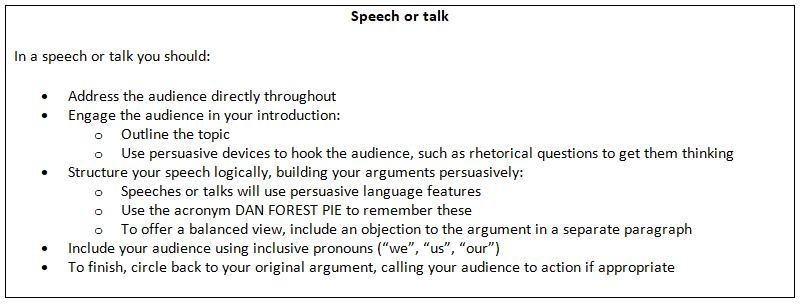
You might wish to structure your speech in the following way:
- Introduce the topic and your point of view
- Use personal and inclusive pronouns to involve your audience, e.g., "you" or "we"
- Engage your audience using a rhetorical question
- You will need to deduce information, thoughts, and viewpoints from the reading material to accomplish this.
- This helps establish a connection with your audience by interacting with them on a personal level. Ensure it is grounded in what you have read.
- This should be derived from and expanded upon the ideas presented in the reading materials.
- This could include statistics, a testimonial, a survey, or a quotation from an expert, all based on the content you have read.
- Conclude your presentation with an emotional appeal.
Persuasive writing
A speech is often more persuasive than other forms of writing. You are trying to persuade your audience that your point of view is valid, and sometimes encourage them to join you. Here are some tips for how to make your speech persuasive:
- Write in the first person (write from your own perspective)
- Using words such as "we" and "us" builds rapport between you and your audience and makes them feel involved
- Present your opinions as facts; as a truth that should not be challenged
- Utilize emotional language and strong directives to prompt your audience to take action.
- Decide on your stance and adhere to it consistently.
- Avoid coming across as overly promotional in your messaging.
Example Introduction to a Speech about GCSEs:
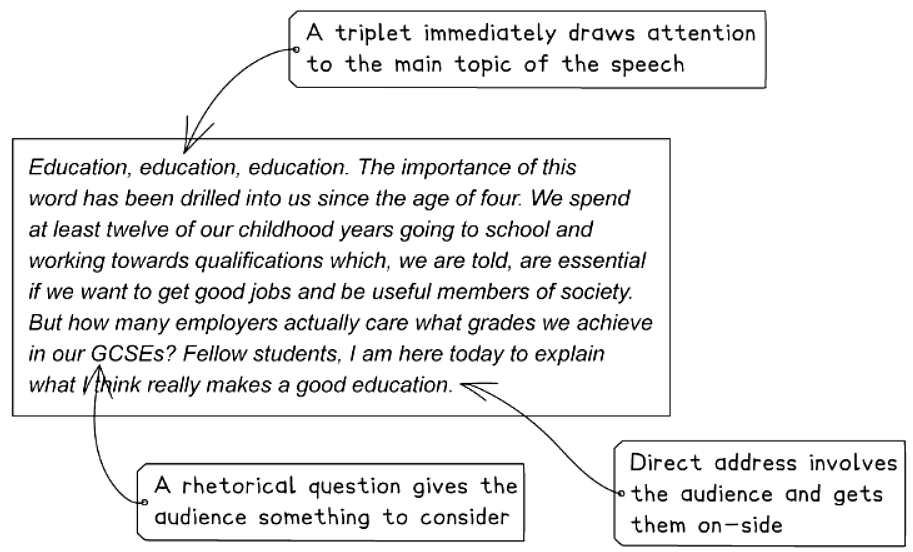
Top Courses for Year 11
Faqs on question 1 directed writing: how to write a speech - english language for gcse/igcse - year 11, viva questions, mock tests for examination, objective type questions, semester notes, question 1 directed writing: how to write a speech | english language for gcse/igcse - year 11, practice quizzes, video lectures, extra questions, shortcuts and tricks, study material, past year papers, sample paper, previous year questions with solutions, important questions.


Question 1 Directed Writing: How to Write a Speech Free PDF Download
Importance of question 1 directed writing: how to write a speech, question 1 directed writing: how to write a speech notes, question 1 directed writing: how to write a speech year 11 questions, study question 1 directed writing: how to write a speech on the app, welcome back, create your account for free.

Forgot Password
Change country.
- Arts & Humanities
- Communications
O Level English Language 1123 Unit 6: Directed Writing
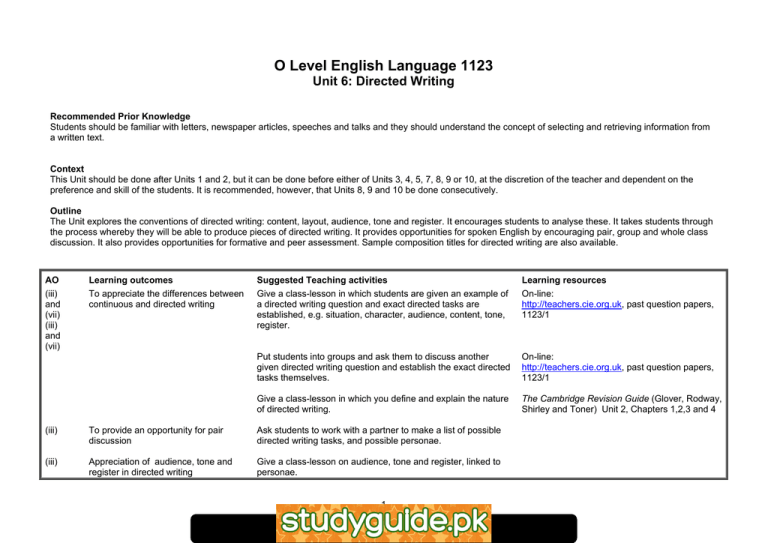
Related documents
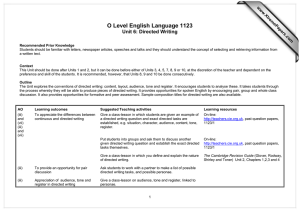
Add this document to collection(s)
You can add this document to your study collection(s)
Add this document to saved
You can add this document to your saved list
Suggest us how to improve StudyLib
(For complaints, use another form )
Input it if you want to receive answer

How to answer Directed Writing for IGCSE First Language English

Free video lessons for Directed Writing
Directed Writing
Are you gearing up for the IGCSE First Language English Paper 2 and feeling a bit daunted by the Directed Writing section? Fear not! In this blog post, I’ll break down the key elements of Directed Writing, focusing on reading and writing skills – the secret ingredients to securing those top marks.

Jump to…
- Video lesson
About IGCSE First Language English Paper 2
Example topics for directed writing.
- How you get graded – reading
- How you get graded – writing
Rhetorical devices
- A* Directed Writing exemplar
- Examiner comments – reading
- Examiner comments – writing
Study Directed Writing with Taughtly
Video lesson for directed writing.
On IGCSE First Language English, you will have two hours to answer two questions:
- Section A: Directed Writing (40 marks)
- Section B: Composition (40 marks)
For Directed Writing, you’ll have to read two short texts that are debating a particular topic, then respond to that topic yourself in a piece of discursive, persuasive or argumentative writing.
Directed Writing is worth 40 out of 80 marks on your Paper 2. You should spend around one hour answering this question.
You will always be asked to write either a speech , letter or magazine article for Directed Writing.
Past paper topics for Directed Writing include:
- Arguing the benefits of listening to podcasts at work
- Whether an individual can make real environmental change
- Whether we should give gifts
- Whether we should make New Year’s Resolutions
- Whether online friendships are real
- If young people can travel responsibly
How you are graded for Directed Writing
Reading marks.
To get the highest marks for reading in Directed Writing for IGCSE First Language English, you need to do the following things:
- Include a range of explicit details from both Text A and Text B – show the examiner that you really understood the arguments the two texts made by directly addressing the ideas in the texts. However, be careful to use your own words when referencing these texts!
- Evaluate the implicit attitudes within the texts. Evaluation means challenging, probing, poking and being critical of the ideas in the texts. Don’t just agree and summarise – give your opinion on the topic and consider ways in which the arguments in the given texts might have flaws.
- No need to be balanced. Cambridge often have a particular viewpoint where you can pick up all or most of the marks. Read the question carefully to assess what perspective Cambridge are pushing you to have.
For example, in the question below, what point of view would Cambridge prefer to steer you towards?

In the above question, the debate at hand is whether or not to apologise in the workplace. From the phrases “how to apologise so that their boss is satisfied” and “how to deal with the situation”, we can see that Cambridge likely are pushing you to the opinion that you should apologise at work. Therefore, when reading the texts, you should keep in mind what the benefits of apologising might be.
Writing marks
When you see your question for Directed Writing, the first thing you should do is unpick the VARPF:
- Voice – who are you writing as? Whose voice are you assuming?
- Audience – who are you writing to?
- Register – how formal or informal should your language be?
- Purpose – why are you writing? To discuss, persuade, argue, inform, entertain, describe, narrate, analyse?
- Format – what type of text have you been asked to write? A letter, magazine or a speech?
For example:

Use the VARPF to help you identify what type of language is most appropriate in your response.
Generally, Directed Writing has a register of semi-formal and lively or formal and lively .
No matter what your task is, you should always:
- Write using correct spelling, punctuation and grammar
- Remember to use correct paragraphs, creating a new paragraph whenever you change topic
- Avoid using slang or very informal language
- Use vocabulary precisely
- Vary your sentence lengths, openings and constructions
For more argumentative or persuasive pieces of writing, consider using some rhetorical devices to make your writing livelier:
A* exemplar for Directed Writing
The exemplar below is a response to a past exam paper. If you’d take to look at the texts, question paper or mark scheme, click the external links below.
- Question Pa per 🔗
- Inse rt 🔗
- Mark sche me 🔗
If the links are broken, you can also try searching for “IGCSE First Language English Paper 2 May/June 2021 0500/21”.

Small change – big difference?
It has never been more critical to tackle the climate change issue, and yet some would argue that individual action is meaningless. Some critics would scoff at our Knightsbridge High water bottles, roll their eyes at our school allotment, and dismiss our move to electric school buses with a wave of their hand. Yet I know that students, parents, and teachers passionately feel that our small changes can make a big difference to our planet.
Though there is an issue with the commercialisation of green issues, that doesn’t mean we should give up entirely. If large corporations want to cash in on recycling and protecting endangered animals to improve their brand image, it still promotes awareness of these issues. True, the problem comes when individuals buy from a so-called green company and then think they’ve done enough and don’t need to act any more, but our community isn’t built of “lazy environmentalists”. What’s lazier than doing nothing at all? Most young people do care and want to get involved; if 76% of people buy products for the environment, doesn’t that show eagerness to get involved? Isn’t it better to harness the will of people who want to help but don’t yet know how to do it efficiently rather than mock them for being part of the capitalist machine?
Schools are the perfect place to begin cultivating the global citizens of tomorrow. Nowhere can collective action be made more evident than in a school, as we see that each of us individuals form classes, and our classes form year groups, and year groups form a high school with over 1,000 passionate students. Knightsbridge could start a campaign to raise awareness of climate issues, such as the impact of meat on the environment and the dangers of reliance on fossil fuels. After all, we’ve introduced Meat Free Mondays! Imagine not just our 1,000 current students becoming ambassadors of these issues but the network of people we will interact with throughout our lives, from future friends we’ve not yet met to workmates at the successful careers we’re all surely destined for.
Through our Global Citizenship lessons, we have all learned that truly impactful change comes from a governmental level. Just think of banning CFC chemicals, which were destroying our Ozone, or reducing acid rain through cutting emissions. Yet we must realise that governments and corporations are also formed from people – and it could be us as leaders of the future! Not only that, but we also have the power to influence these entities by lobbying the government or choosing which party we vote for at elections. We shouldn’t act helpless as though these institutions are entirely out of our influence.
Ultimately, tackling this impending climate disaster will take hard work, but it’s not a luxury to decide whether to get involved or not: it is our duty, our moral imperative, to save our planet. If not us, then who? As the younger generation, no one has more to lose than us. Now is not the time to give up hope. Now is the time to understand that saving this planet will require individual and collective effort – it’s not either/or.
Let’s encourage our prefects, teachers, school leaders and parents to invest not just in their children’s educations but into the very planet that sustains our ability to breathe clean air, admire cerulean skies, and accomplish our dreams beyond the present day… together.
Assessing the A* exemplar for Directed Writing
Your examiner will assess you for reading by identifying the following features:
- ✓ Tick any explicit details from the source texts
- EVAL for any effective evaluation of implicit ideas
- DEV for giving opinions on the topic but not evaluation

15/15 marks Candidate challenges ideas in both texts, interweaving ideas throughout their writing. Shows a sophisticated understanding of the debate at the heart of the text about the tensions between individuals and larger institutions in tackling climate change. Examiner mark for Directed Writing – Reading
Your examiner will assess you for writing by identifying the following features:
- ____ Underline any SPAG errors or expression issues
- V for impressive vocab
- R for effective register that sounds like a student magazine

25/25 marks Candidate writes with consistent accuracy and ambition in both vocabulary choices and sentence structures. A sophisticated style with flair, capable of expressing abstract ideas. Paragraphs are structured by argument and build to a conclusion. Register is effective for a school magazine article. Examiner mark for Directed Writing – Writing

Free video lessons, PowerPoints and quizzes available to help you on Taughtly.co.uk:
- Paper 2 Tips & Tricks – includes 40 minutes of teaching Directed Writing with an example for the topic of over-tourism
- Directed Writing – video lesson, exemplar and quiz for Directed Writing on the topic of green shopping
- How to write the six text types for IGCSE First Language English : revise speech, letter and magazine article writing, which could all come up on Directed Writing.
Sarah O’Rourke
I’ve been teaching for nine years, working in the UK and in China. I have a Master’s degree in Education and an Undergraduate degree in English language and literature.

IMAGES
COMMENTS
Aug 27, 2024 · Persuasive writing. A speech is often more persuasive than other forms of writing. You are trying to persuade your audience that your point of view is valid, and sometimes encourage them to join you. Here are some tips for how to make your speech persuasive: Write in the first person (write from your own perspective) Use personal and inclusive ...
Apr 5, 2023 · Try completing past IGCSE directed writing tasks and ask your teachers, peers, or tutors for feedback. This will help you identify areas for improvement and gain valuable insights on how to enhance your writing. We will update this post a little later with an example directed writing sample, written to the prompt but we hope that you’ve ...
directed: speech Your school is having a month-long ‘A Healthy Body Campaign’. As President of the Health Club of your school, you decide to give a speech on the ‘Tak nak Campaign’ recently launched by the government.
Information about Question 1 Directed Writing: How to Write a Speech covers topics like Introduction, Key Features of a Speech, Persuasive writing and Question 1 Directed Writing: How to Write a Speech Example, for Year 11 2024 Exam. Find important definitions, questions, notes, meanings, examples, exercises and tests below for Question 1 ...
AO Learning outcomes Suggested Teaching activities Learning resources (iii) and (vii) (iii) and (vii) To appreciate the differences between continuous and directed writing Give a class-lesson in which students are given an example of a directed writing question and exact directed tasks are established, e.g. situation, character, audience ...
£ÿÿ E5ë‡D ô! ‘²pþþ æ¾| ÿÿ ûóµ£W ó,„M oà ÒOK»¥=f-m Yr$ Ã)£©ú º ücR&· Ä ê´ÛIç ¶¬„"UI¶ã ï ýÕki¬\V ÔÜæ¤ 7 ¤«bÀþ ...
iH;YP\N´F^s\´lOH´hmHjlP^\ \´,mHjlP^\´ »´u^m´sPZZ´CH´NPrH\´;´jDH\;iP^´C;jHF´^\´lOH´lOH[Hj´^M´lOH´iH;FP\N´lHtlÎjϺ´8^m´sPZZ´CH´l^ZF´lOH
Section A: Directed Writing | CIE IGCSE English Language Revision Notes 2020 Created Date: 10/2/2024 1:35:42 PM ...
When you are writing a speech, whether it is for directed writing or for coursework, there are two very important things to remember: A speech is a means of communicating with an audience- possibly quite a large audience- and you want to be sure that they all understand what you are saying. To help with this, think of more than one
For Directed Writing, you’ll have to read two short texts that are debating a particular topic, then respond to that topic yourself in a piece of discursive, persuasive or argumentative writing. Directed Writing is worth 40 out of 80 marks on your Paper 2. You should spend around one hour answering this question. You will always be asked to ...